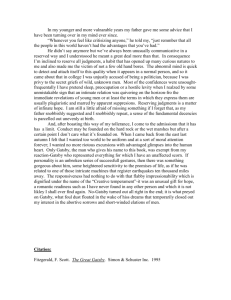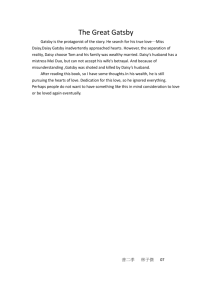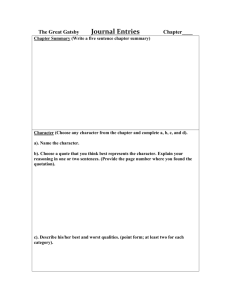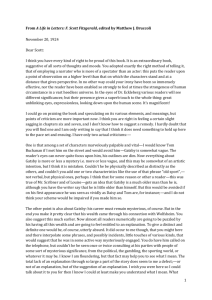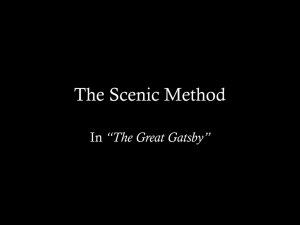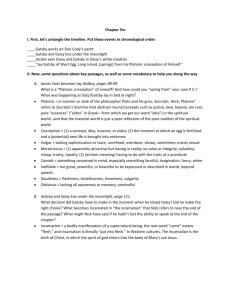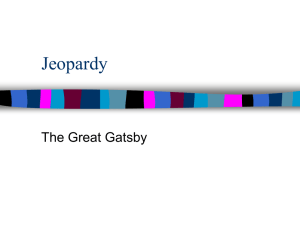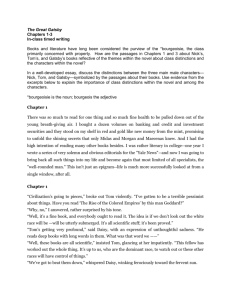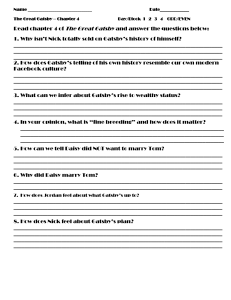I suppose he`d had the name ready for a long time, even then. His
advertisement
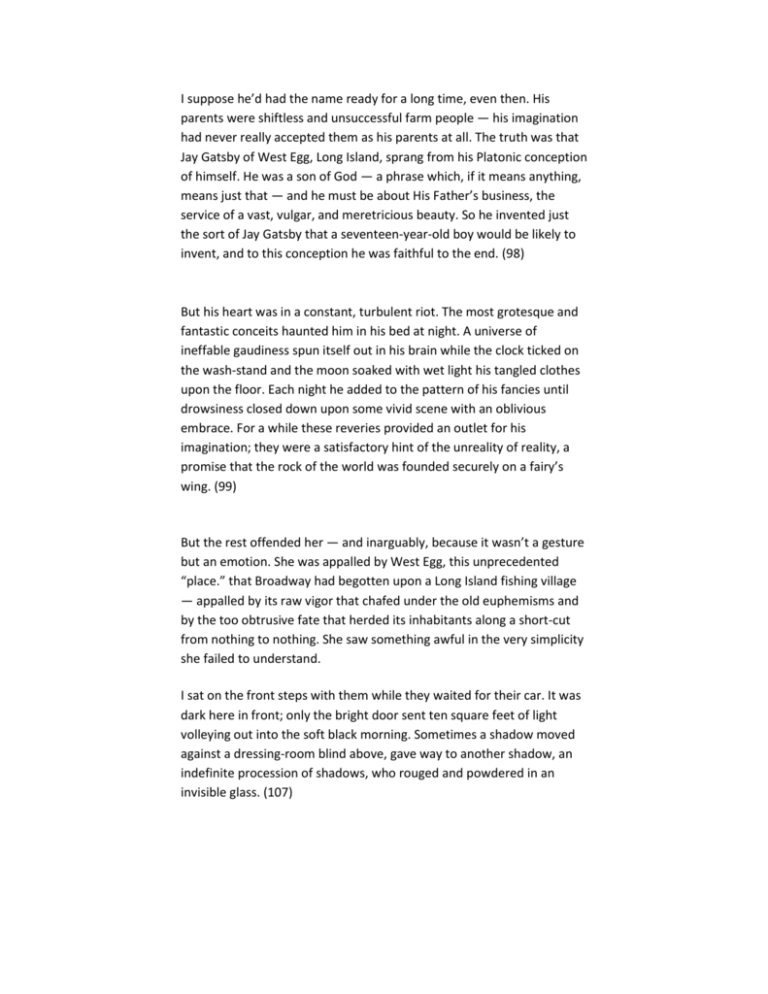
I suppose he’d had the name ready for a long time, even then. His parents were shiftless and unsuccessful farm people — his imagination had never really accepted them as his parents at all. The truth was that Jay Gatsby of West Egg, Long Island, sprang from his Platonic conception of himself. He was a son of God — a phrase which, if it means anything, means just that — and he must be about His Father’s business, the service of a vast, vulgar, and meretricious beauty. So he invented just the sort of Jay Gatsby that a seventeen-year-old boy would be likely to invent, and to this conception he was faithful to the end. (98) But his heart was in a constant, turbulent riot. The most grotesque and fantastic conceits haunted him in his bed at night. A universe of ineffable gaudiness spun itself out in his brain while the clock ticked on the wash-stand and the moon soaked with wet light his tangled clothes upon the floor. Each night he added to the pattern of his fancies until drowsiness closed down upon some vivid scene with an oblivious embrace. For a while these reveries provided an outlet for his imagination; they were a satisfactory hint of the unreality of reality, a promise that the rock of the world was founded securely on a fairy’s wing. (99) But the rest offended her — and inarguably, because it wasn’t a gesture but an emotion. She was appalled by West Egg, this unprecedented “place.” that Broadway had begotten upon a Long Island fishing village — appalled by its raw vigor that chafed under the old euphemisms and by the too obtrusive fate that herded its inhabitants along a short-cut from nothing to nothing. She saw something awful in the very simplicity she failed to understand. I sat on the front steps with them while they waited for their car. It was dark here in front; only the bright door sent ten square feet of light volleying out into the soft black morning. Sometimes a shadow moved against a dressing-room blind above, gave way to another shadow, an indefinite procession of shadows, who rouged and powdered in an invisible glass. (107) “You come to supper with me,” said the lady enthusiastically. “Both of you.” This included me. Mr. Sloane got to his feet. “Come along,” he said — but to her only. “I mean it,” she insisted. “I’d love to have you. Lots of room.” Gatsby looked at me questioningly. He wanted to go, and he didn’t see that Mr. Sloane had determined he shouldn’t. “I’m afraid I won’t be able to,” I said. “Well, you come,” she urged, concentrating on Gatsby. Mr. Sloane murmured something close to her ear. “We won’t be late if we start now,” she insisted aloud. “I haven’t got a horse,” said Gatsby. “I used to ride in the army, but I’ve never bought a horse. I’ll have to follow you in my car. Excuse me for just a minute.” The rest of us walked out on the porch, where Sloane and the lady began an impassioned conversation aside. “My God, I believe the man’s coming,” said Tom. “Doesn’t he know she doesn’t want him?” “She says she does want him.” “She has a big dinner party and he won’t know a soul there.” He frowned. “I wonder where in the devil he met Daisy. By God, I may be old-fashioned in my ideas, but women run around too much these days to suit me. They meet all kinds of crazy fish.” . . . One autumn night, five years before, they had been walking down the street when the leaves were falling, and they came to a place where there were no trees and the sidewalk was white with moonlight. They stopped here and turned toward each other. Now it was a cool night with that mysterious excitement in it which comes at the two changes of the year. The quiet lights in the houses were humming out into the darkness and there was a stir and bustle among the stars. Out of the corner of his eye Gatsby saw that the blocks of the sidewalks really formed a ladder and mounted to a secret place above the trees — he could climb to it, if he climbed alone, and once there he could suck on the pap of life, gulp down the incomparable milk of wonder. His heart beat faster and faster as Daisy’s white face came up to his own. He knew that when he kissed this girl, and forever wed his unutterable visions to her perishable breath, his mind would never romp again like the mind of God. So he waited, listening for a moment longer to the tuning-fork that had been struck upon a star. Then he kissed her. At his lips’ touch she blossomed for him like a flower and the incarnation was complete. Through all he said, even through his appalling sentimentality, I was reminded of something — an elusive rhythm, a fragment of lost words, that I had heard somewhere a long time ago. For a moment a phrase tried to take shape in my mouth and my lips parted like a dumb man’s, as though there was more struggling upon them than a wisp of startled air. But they made no sound, and what I had almost remembered was uncommunicable forever. (110-111)

